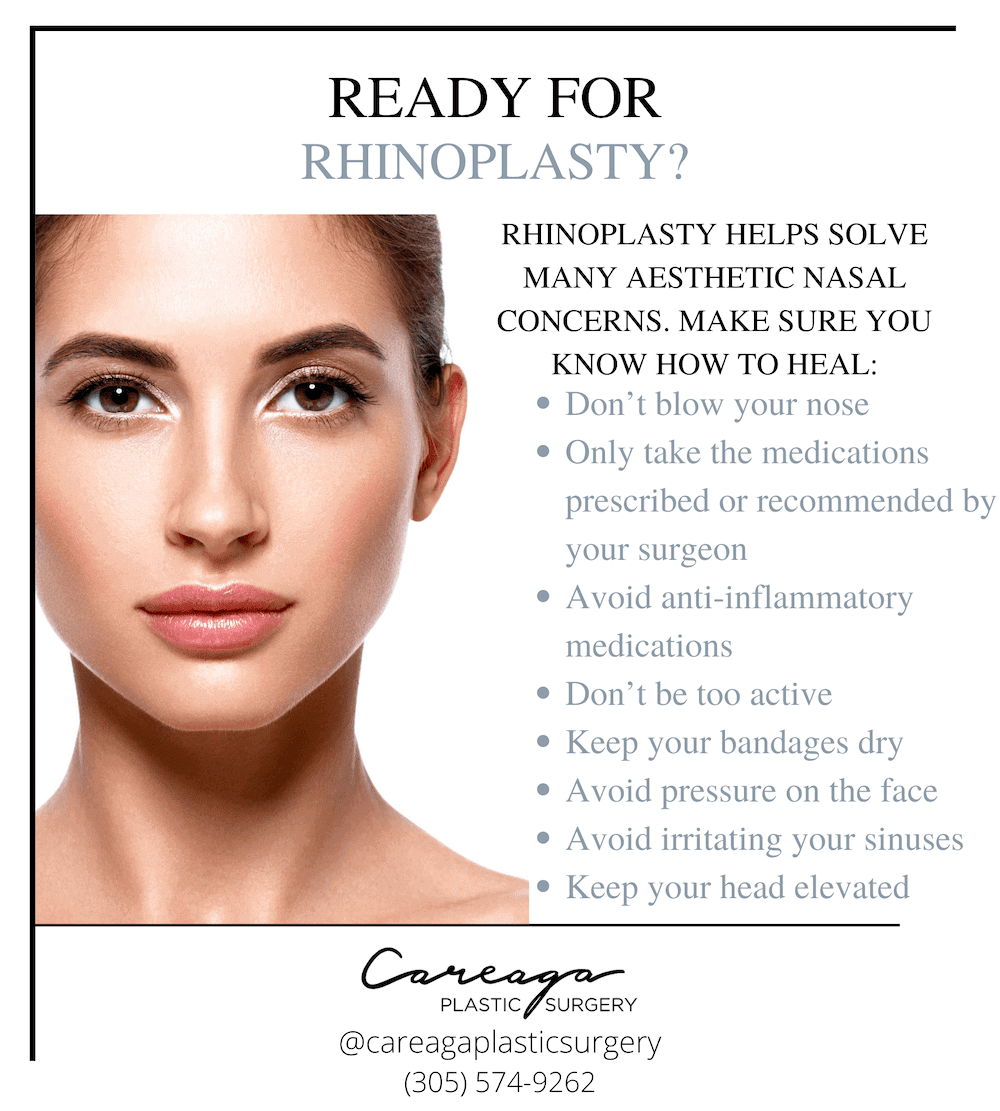Dr. Durand’s Recovery Tips: How to Take Care of Your Nose After Rhinoplasty
Posted September 27, 2022 in Rhinoplasty
5 Minute Read:
Many men and women have the desire to change the appearance of their noses. Cosmetic issues with the nose can be biological (issues you were born with) or caused by an unexpected event (a broken nose).
Some of the common problems that men and women experience with their noses include: nasal humps, a drooping nasal tip, a crooked nose, or a nose that is simply too big or too small for their face, according to their personal standards.

Whether you are frustrated with the shape, size, or general look of your nose, the good news is that rhinoplasty (corrective nose surgery) can help correct many issues you may be struggling with to give you a nose that perfectly compliments your other facial features. Some of our favorite celebrities have had rhinoplasty and been left with even more beautiful faces!
In addition to a more aesthetically pleasing nose, you can also improve your sense of self-confidence, which can let you look at your reflection in the mirror and smile at what you see.
However, rhinoplasty is only the first step in achieving the nose you’ve always wanted. It is important that you follow all of your post-surgical instructions to ensure that your recovery period is as smooth as possible and that your results are exactly what you desire.
What Can I Expect for My Rhinoplasty Procedure?
Rhinoplasty is an invasive surgical procedure in which an incision is made in your nose (either across the columella for an open rhinoplasty or within the nostrils for a closed rhinoplasty).
Through this incision, Dr. Durand will make the necessary corrections. This may include removing portions of bone or cartilage or modifying the nose with the use of cartilage grafts.
How Can I Improve My Rhinoplasty Recovery?
Like any plastic surgery procedure, rhinoplasty requires a recovery period. While most men and women are able to return to their normal, daily activities after two to four weeks, some patients require a longer recovery time.
During this time, it is important that you rest to allow your body time to heal itself. However, below you will find additional tips that can help speed up and improve your recovery period.
1. Don’t Blow Your Nose
It may sound like a no-brainer, but blowing your nose can be problematic after rhinoplasty.
When you blow your nose after nose surgery, you can cause bleeding in the nose, which can prolong your recovery, and, even worse, can negatively affect the newly created structure of your nose.
When you place ice on your surgical area, you not only can help alleviate any discomfort you experience (since the cold works to numb the area), but the ice also helps to slow the blood flow, which can help minimize inflammation (swelling) and bruising.
Doing so will only help to speed up your recovery period.
2. Only Take the Medications Prescribed or Recommended by Your Surgeon
After your rhinoplasty, you will likely experience some discomfort. While prescription medication can be taken to alleviate any pain, it is important that you avoid anti-inflammatory medications.
Though it is a bit confusing, anti-inflammatory medications like ibuprofen can actually increase bleeding, leading to more inflammation than you would otherwise have.
That is why it is so important to only take the medications prescribed or recommended by Dr. Durand.
3. Don’t Engage in Demanding Physical Activity
During your recovery period, it is important that you allow your body the time it needs to heal. Trying to speed up your recovery by engaging in strenuous activities, such as household chores, exercise, or lifting heavy objects can put pressure on your surgical area, which can result in your nose bleeding.
When your nose bleeds, you can be left with negative results. So, enjoy the required time off as you allow your nose to heal.
4. Take Care of Your Bandages
After your nose surgery, you will be required to wear a splint.
Gauze bandages will be worn for the first week to help keep the splint in place and protect your nose. However, as you go about your day, you will find that your bandages become moist with blood that oozes out of the incision area.
This is completely normal but is cause to change the bandages as much as needed. By not changing the bandages, you can delay your healing and even cause infection.

5. Avoid Irritating Your Sinuses
If you suffer from allergies and other sinus issues, then it may be smart to schedule your rhinoplasty for a time in which your allergies are at a minimum. That is because sinus pressure can build up and cause you to sneeze (or need to blow your nose), which can dislodge sutures, cause bleeding, and negatively affect your results.
To combat sinus issues after your rhinoplasty, you can use a saline spray or recommended decongestants. Always check the recommendations of your doctor first.
6. Keep Your Head Elevated
You’ve probably heard that it is important to keep injured areas elevated, and this goes for rhinoplasty, as well.
Keeping your head (and by extension your nose) elevated helps to reduce the amount of swelling you experience. This is because less blood is able to rush to the area. This reduced swelling will help speed up your recovery and give you the best results possible.
Additionally, it is important that you sleep on your back during your rhinoplasty recovery with your head slightly elevated.
Interested in Learning More About Nose Surgery in Miami?
If you are interested in learning more about rhinoplasty or any of the other facial rejuvenation procedures we offer in Miami, Florida, please give us a call at (305) 960-7511 or fill out our online contact form.
